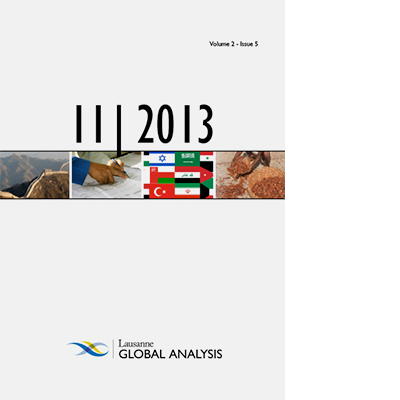Welcome to the November issue of Lausanne Global Analysis.
Whether you are planning to read the full articles or just the executive summaries, we hope that you find this issue stimulating and useful. Our aim is to deliver strategic and credible analysis, information and insight so that as a leader you will be better equipped for the task of world evangelization. It’s our desire that the analysis of current and future trends and developments will help you and your team make better decisions about the stewardship of all that God has entrusted to your care.
In this issue we address several topical themes. We analyse what has come out of the groundbreaking Asian Christian Leaders’ Forum held in Seoul in June, and we address Business as Mission (BAM), one of the key themes of the Global Leadership Forum held in Bangalore the week before. We also explore a topic related to BAM — that of Stewardship and Justice in the way we behave as consumers. We follow up our article in our March issue on the various ideological trends in China and Christian responses to them by anaylsing the results of a recent conference on the subject. Last, but by no means least, we examine the outlook — and many opportunities — for Christians in the Middle East amid the current turmoil and persecution.
The Asian Church Leaders Forum (ACLF) held in Seoul in June 2013 seemed at first like any other international conference, writes Ezra Jin. “However, for the representatives of the house churches in China, it was a conference of far-reaching significance. The deep sorrow felt by Chinese representatives at not being able to attend the Third Lausanne Congress at Cape Town in 2010 was greatly relieved”. ACLF also brought comfort and unity for Chinese representatives who “felt accepted and included by the global family”. The impact of ACLF will be felt in various areas, not least its ‘2030 vision’, which provides a specific and clear direction for the church in China, mobilising resources and passion for world mission.
The eruption of revolts across the Middle East during the last two years has unleashed a process of change that will take generations to play out, writes Wafik Wahba. The main beneficiary of this change was the Muslim Brotherhood. However, the Islamist agenda has been exposed for what it is. Meanwhile, in the last twenty years there has been a “significant surge in the number of Muslims coming to Christ”. The estimated 5 million Christians from a Muslim background today can be found in almost every country in the region. They face severe persecution. “However, their perseverance and faithfulness are a remarkable witness to the gospel”. Middle Eastern Christians may well face further times of persecution. However, the church will be stronger and bolder in its witness. The global church needs to be active in praying for and standing along their brothers and sisters, who for centuries have kept the lamp of faith burning amid turmoil and persecution.
Business as Mission, BAM, is a new term but the underpinning concept is not, writes Mats Tunehag. It is a rediscovery of biblical truths and practices. Our first God-given mandate is the creation mandate (Genesis 1-3). This includes being creative in business — to create wealth. “As Christians we often focus more on wealth distribution, but there is no wealth to distribute unless it has been created”. We need to affirm and encourage business people to exercise their calling with professionalism, excellence and integrity. BAM is a small but growing global movement of Christians in the marketplace seeking to serve God and the common good through business. BAM is about societal transformation, which implies building the formal economy. He concludes: “BAM is an intergenerational issue, like other movements of societal transformation. We want to set a stage and serve our generation in such a way that it will be a blessing for many generations to come”.
Our homes, workplaces, shops and markets are full of items made from around the world. However, we do not often consider the individuals behind the making of what we buy. “Because our world is global, we have an opportunity to care for others across borders through our everyday shopping, simply by being aware of the conditions in which they work and by making purchases that help those behind our products”, writes Carrie Ngangnang. Tithing a tenth of our income to God is one way to express gratitude and acknowledgment that all we have are blessings from him. However, we often do not consider how we spend the remaining 90% — which is also a stewardship issue. Organisations such as Trade as One and Food for the Hungry encourage consumers to spend in a way that extends compassion across borders. “Followers of Jesus can participate in restoration work throughout the world and the redemption of land and people by making purchases that seek to care for others globally”, she concludes.
In August 2013, the 6th Annual Forum for Chinese Theology on ‘Christian Faith & Ideological Trends in Contemporary China’ in Oxford brought together a significant group of Christian, Confucian, Leftist and Liberal Scholars from China and around the globe. It produced two notable outcomes, Thomas Harvey writes. Firstly, the Oxford Consensus 2013 commits them to work together in mutual respect and shared concern to address the various challenges facing China and the world. Secondly, the conference served notice of the relevance of global Christianity when it engages secular academic scholars to address issues impacting civil society. “This conference represents an important step towards understanding the relationship between Christian faith, ideology and civil society. It also created significant connections between leading Christian and non-Christian academics and institutional leaders from China and the West”, he concludes.
Please send any questions and comments about this issue to analysis@lausanne.org. The next issue of Lausanne Global Analysis will be released in January.

